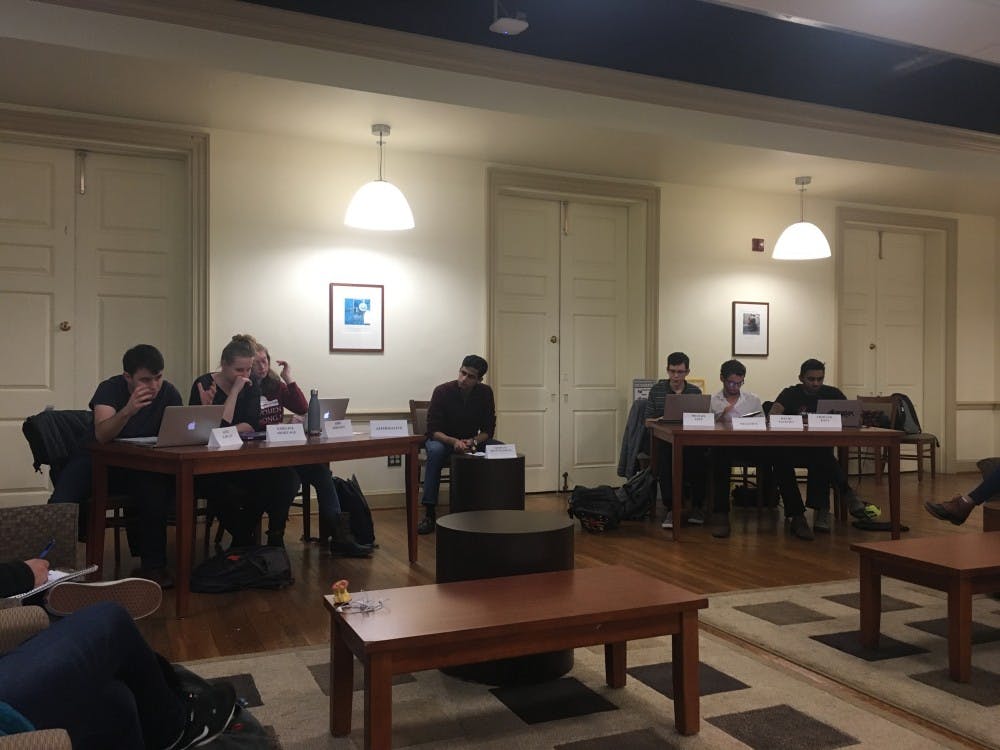Discourse, a new student organization that hosts semi-monthly debates among members of the Hopkins community, hosted its second-ever event in Levering Lounge on Tuesday.
The debates are modeled after the Oxford Union style. In this model, participants debate opposing sides of a given topic. The audience votes for their chosen side once before the event and once afterwards. Audience members also engage in an open discussion following the debate.
Sophomores Turquoise Baker and Caroline West were two of the event’s organizers. They said that Discourse was founded to invite less formal and intimidating conversations on controversial topics.
The non-partisan student group IDEAL has also sought to foster civic discussion between people with opposing viewpoints. West explained that Discourse covers a wider range of issues than IDEAL, which focuses primarily on political issues.
“We’re hoping to move beyond that scope to intellectual, theoretical, philosophical questions and even scientific questions,” West said. “IDEAL is primarily open discussion, [but] we try to have the combination of the formal debate alongside the open discussion, with the idea that the structured debate encourages really intense critical thinking.”
Baker said that the open discussions were a key element of Discourse events.
“We want to make sure that we give a lot of people the opportunity to come but still allow an intimate environment,” she said.
Tuesday’s debate was on the statement: “The harmony of a diverse community is more important than an individual’s right to free speech.” West said that the topic was particularly relevant today.
“We felt it was especially important to have this conversation because that’s something that we are really grappling with as a generation,” she said.
The formal debate consisted of three rounds, during which the affirmative and negative sides spoke for four minutes each, with questions from the audience between each round. The open discussion that followed included conversations between debaters and audience members.
Sophomore Abigail Johnson, who presented on the affirmative side, reflected on a personal experience when a student denied a rape case during a class discussion, despite being presented with evidence of the rape. The professor did not interrupt the student or deny this opinion.
“In this scenario, free speech of an individual was not curbed in favor of the harmony of the diverse community,” Johnson said. “I personally felt unsafe and insulted in that space.”
Senior Emeline Armitage, who also argued for the affirmative, stated that open discussion does not offer an equal opportunity to present ideas amongst speakers who may face structural barriers.
“People do not start off on an even playing field when they enter into this forum of ideas,” Armitage said. “Institutions need to come up with controls to elevate certain people’s speech and to quell others’ speech.”
On the negative side, freshman Michael Leff argued that hindering the free exchange of ideas is damaging and dangerous to society’s progression.
“As individuals we need to be understanding that some people might take offense to things, but that is primarily an individual responsibility rather than a societal regulation,” Leff said.
He emphasized the importance of the exchange of ideas.
“Society progresses, we move forward with better ideas and more understandings of each other and a more harmonious society than if we were just existing in parallel,” he said.
Sophomore David Saveliev also spoke on the negative side, saying that society’s survival depended on free speech. He shared his experience of seeing the Ukranian-speaking population oppressing the Russian-speaking population in Ukraine, which resulted in a civil war backed by Russian militants.
“You have only two paths,” he said. “One path is that the discriminated minority will be able to have discourses and be able to bring out their ideas in peaceful, nonviolent ways. The other path is that you radicalize this minority, and you end up with violence.”
Audience member and freshman Kimberly Robins believed that the motion was left somewhat unanswered, as she stated that both sides somewhat agreed with each other.
“Everyone agreed that free speech is valuable but needs to be limited to a certain extent,” Robins said. “The discussion was more about to what extent it should be limited... I think we got a lot of interesting perspectives on that, but it didn’t really tie back to the prompt.”
Robins also suggested additional designated time within each round of debate to answer questions.
“For [debaters] to feel pressure to incorporate answers to questions that they don’t necessarily have into their already restricted time... that could have handled better,” Robins said.
Editor’s Note: Emeline Armitage is a frequent contributor to the Opinions section and was not involved in reporting this piece.





